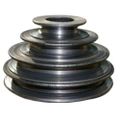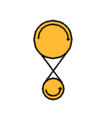Pulleys: Difference between revisions
From DT Online
m Added link |
mNo edit summary |
||
| Line 2: | Line 2: | ||
[https://en.wikipedia.org/wiki/Pulley '''Pulleys'''] are used to transfer rotating motion, via a belt, from one shaft to another. Car engines for example, often use pulleys connected by a Fan Belt to transmit power from the engine to the magneto and water pump. | [https://en.wikipedia.org/wiki/Pulley '''Pulleys'''] are used to transfer rotating motion, via a belt, from one shaft to another. Car engines for example, often use pulleys connected by a Fan Belt to transmit power from the engine to the magneto and water pump. | ||
If a pulley drives another pulley of the same diameter, then they will both rotate at the same speed. The pulley doing the driving is known as the '''Driver''' and the receiving pulley is known as the '''Driven'''. A large Driver pulley will cause a smaller Driven pulley to rotate faster and vice versa. A smaller Driver will cause the Driven to rotate more slowly but there will be an increase in its turning power or [https://en.wikipedia.org/wiki/Torque '''Torque'''] | If a pulley drives another pulley of the same diameter, then they will both rotate at the same speed. The pulley doing the driving is known as the '''Driver''' and the receiving pulley is known as the '''Driven'''. A large Driver pulley will cause a smaller Driven pulley to rotate faster and vice versa. A smaller Driver will cause the Driven to rotate more slowly but there will be an increase in its turning power or [https://en.wikipedia.org/wiki/Torque '''Torque'''] | ||
Revision as of 12:24, 19 January 2016

Pulleys are used to transfer rotating motion, via a belt, from one shaft to another. Car engines for example, often use pulleys connected by a Fan Belt to transmit power from the engine to the magneto and water pump.
If a pulley drives another pulley of the same diameter, then they will both rotate at the same speed. The pulley doing the driving is known as the Driver and the receiving pulley is known as the Driven. A large Driver pulley will cause a smaller Driven pulley to rotate faster and vice versa. A smaller Driver will cause the Driven to rotate more slowly but there will be an increase in its turning power or Torque
Note: The Driver and Driven pulleys both rotate in the same direction unless, as is possible with Flat or Round Belt Drives for example, the belt is given a half twist. The flexibility of some belt drives also allows the Driver shaft and Driven shaft to be in different orientations - e.g. one at right angles to another.
Assuming the belt does not slip and there are no frictional losses, then a pulley will drive another half its size at twice the speed and so on - i.e. . the Velocity Ratio is equal to Distance Moved by Effort divided by Distance Moved by Load which is proportional to Driver Pulley Diameter divided by Driven Pulley Diameter. Similarly the Mechanical Advantage, in this case the increase in Torque, can be calculated by dividing the diameter of the Driven pulley by the diameter of the Driver pulley.
Note: Additional pulleys may be added to the drive, e.g. to drive additional equipment, to guide the belts around obstacles or in the form of a Jockey Pulley to tighten belts and maintain contact with the pulleys. These extra pulleys do not affect the Mechanical Advantage or the Velocity Ratio of the system overall however (other than to increase frictional losses) and these continue to be calculated by reference only to the size of the first Driver pulley and last Driven pulley
Pages in category "Pulleys"
The following 10 pages are in this category, out of 10 total.
Media in category "Pulleys"
The following 7 files are in this category, out of 7 total.
-
BlockTackle.jpg 208 × 501; 13 KB
-
ConePulley.jpg 500 × 500; 21 KB
-
MechanismsTheWindlass.jpg 227 × 339; 9 KB
-
PulleyAnimation.gif 248 × 280; 30 KB
-
Pulleys2.gif 248 × 280; 32 KB
-
ToothedBeltDrive.jpg 500 × 293; 14 KB
-
VeeBeltDrive.jpg 346 × 286; 17 KB






